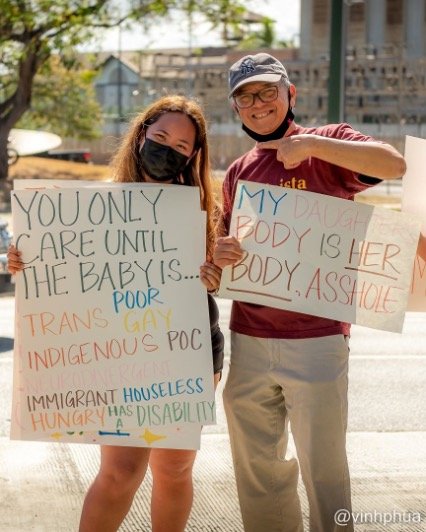Raising a Gen-Z Filipina American

What has happened since then?
Anyone with an American child with raging hormones and a misplaced sense of confidence knows the strain every Filipino immigrant parent goes through. There is no backing down, and tactics shift when she feels vulnerable. Instead of the "no way" of pre-teenage years, we now have the "I demand a conversation" of the Gen-Z. I cynically regard it as a ploy to gain time. This teenage audacity is exceptionally irritable to Filipino parents since we were not raised the same way back in the old country.
Our parent-children relationship –particularly among us probinsyanos – was a one-way street. We were required full compliance with the parents' diktat, and those who defied had to be ready for the belt. "Spare the rod and spoil the child" was the mantra accepted by our elders – from my parents and their cohort group to even one of my professors at the University of the Philippines -- the late eminent historian Teodoro Agoncillo.
One may be aware of the legal repercussions of replicating this cruelty here, yet at the height of some contentious exchanges, I sometimes wish it was possible to do what Prof. Agoncillo admonished us to do, to my American kid. That said, however, in recent years, my frustration has gradually given way to guarded admiration. As I listen to her monologues, I quietly smile and say, "Yeah, good argument, smart kid."
Then there is social responsibility, which we often call utang na loob or pakikisama (the Pinoy thug slang is maki-cosa). I have come to doubt whether the sense of duty to family is there. We watched our parents set aside their happiness, working 23:7 to get us educated and ready for the outside world. Their parents were more audacious, fighting a war to prevent autocrats and racists from ruling their world and rebuilding their lives amidst the rubble.
I am not sure if our Gen-Z Fil-Am kids see us in the same manner. This is essentially our fault, though. When they came into this world, we were already middle-class, white-collar professionals with financial security and happily exempted from fighting for the country (we did not have to worry about the Moro separatist rebellion and the communist insurgency; the poor's children who constitute the bulk of the Philippine military took care of these conflicts).
Achieving this petit-bourgeois status and even breaking into the elite ranks meant adopting the norms associated with the class to which our Gen-Z grew. Personal accessories are a priority to them – from the constantly upgraded mobile phone to several credit cards, a car and education. At home, the iPhone receives more TLC than the father, but I occasionally get surprised when told by her friends how much she brags about our books. Such comments temper the exasperation.
What many Gen-Z highlight as part of their "identity" is often superficial and highly selective. There is mano po, adobo, lechon, and halo-halo, but expect less of them thinking in terms of the family, or the clan. The do’s and don'ts our parents pounded into us as we were growing up back home do not apply to our Gen-Z Fil-Am kids. Neither does knowing the totality of the home country's complicated history.
“The do’s and don’ts our parents pounded into us as we were growing up back home do not apply to our Gen-Z Fil-Am kids.”
I can go on reciting the contradictions, but the underlying cause is singular: simply put, our Gen-Z children are as American as the kids from other ethnic groups. As such, it may be better for our blood pressure if instead of shouting at them to "act like a Filipino" we start thinking and acting like the American parents they expect us to be.
And there is something genuinely virtuous about Gen-Z that bodes well for the future.
Like many in her generation, my daughter strongly believes justice is all-encompassing. In high school, she and her friend got the politically reticent administrators to allow them to lead a small gathering to discuss the Parkland mass shooting. She has since then become an advocate for the children of poor Hawaiians.
She despises the degeneration of their elders' politics, the racism and love for the authoritarian Trump. She and her friends detest how Lolo has fallen in love with Donald Trump and how Tatay now adores Digong Duterte. A friend worried about the authoritarian streak in American politics, but I also told her that our Gen-Z children will fight tooth and nail to reverse this. Hence, my daughter wishes there were more Barack Obamas, Adam Kinzingers, Alexandra Ocasio-Cortezes, and Meghan Milloys (the head of Republican Women for Progress).
Gen-Zs do not see skin color; they see a human being in front of them. It is no wonder that compared with us and our parents, our children see interracial dating as something that happens naturally when Gen-Z kids (and their millennial and Gen-X peers) are attracted to one another.
Finally, my kid told me she wished to see my family and our friends again, but not in the usual way many Filipino Hawaiian kids reconnect with the Old Country. She wants to read what her parents have written about the Philippines, and then delve into her own history; how she, a kid who grew up poor in the countryside of Mati, Davao Oriental, ended up living in many places. She longs to feel what it is like to be an American and a Filipina in the Philippines, to embrace the hazards that may come with all that, and then to bring back to Hawai'i -- her home -- the nuances of our identity.
So, my guarded optimism remains as we move forward into my daughter’s twenties.

Patricio N. Abinales teaches at the Department of Asian Studies, University of Hawaiʻi -Manoa.
More articles from Patricio Abinales






No comments:
Post a Comment